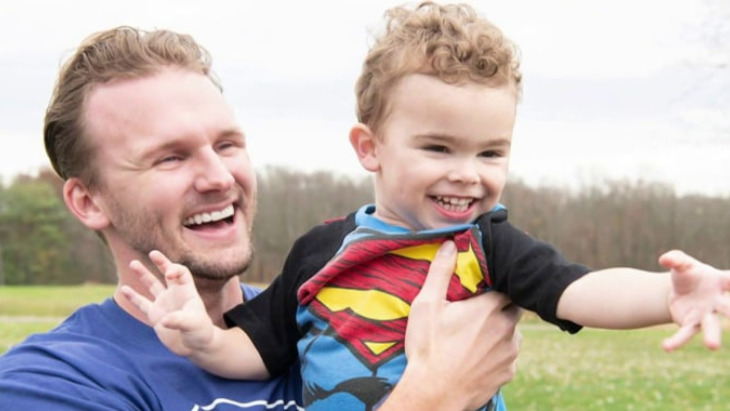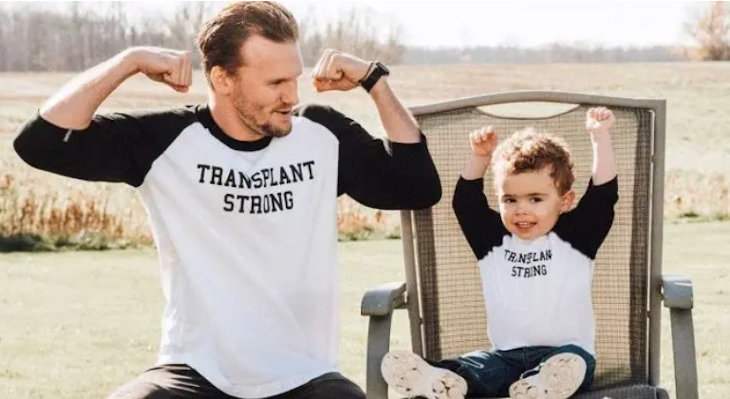 Passover’s Message of Hope in the Aftermath of Oct. 7
Passover’s Message of Hope in the Aftermath of Oct. 7


6 min read
Kindness goes in both directions.
On November 6, 2019, Matt and Andrea Campbell noticed that their one-year-old son Brooks' eyes and skin looked yellow, a sign of jaundice. The next day they took him to their pediatrician, which led to a trip to the emergency room at nearby Akron Children's Hospital. A day later, Brooks was being transported by ambulance to Cleveland Clinic Children's, where he was diagnosed with acute liver failure.
Dr. Koji Hashimoto, the hospital’s director of living donor transplantation, made it clear to the Campbells that they had a few days to find little Brooks a match. Matt was hoping to be the donor, but after six hours of testing, doctors determined he had a blood clotting disorder that disqualified him. The rest of his family was also ruled out because they had the same disorder.
Andrea couldn’t be a donor because she was 15 weeks pregnant. Her brother Grant had flown in and was in the room when they found out nobody eligible was a match to donate their liver. Grant volunteered on the spot. By the next day, he was cleared and Brooks was being prepped for surgery. On November 13, 2019, Grant underwent a six-hour surgery and then Brooks underwent a 13-hour transplant surgery led by Hashimoto that was successful. Brooks is now a rambunctious three-year-old whose liver is continually monitored by doctors.
 Grant and his nephew Brooks
Grant and his nephew Brooks
Grant selflessly underwent surgery and gave his liver to save his nephew’s life. But here’s the most amazing part of the story. Grant immediately came to be with his sister and her family when he first heard of the dire circumstance. It was a very turbulent time in his life. He had recently moved away from his family to Texas, ended a relationship, and had a new business fail which led to severe depression.
He had gone into isolation and was having thoughts about taking his own life. When his nephew needed him, he found his purpose, his will to live, he had done something for someone that gave him life. Grant's selfless act saved his nephew, but if you ask Grant, he’ll tell you that his nephew saved his life.
Acts of lovingkindness benefit both the recipient and the giver.
One of the reasons the Book of Ruth is read on the holiday of Shavuot, the Midrash teaches, “is to learn how great is the reward of those who do deeds of lovingkindness.” What does this story add to what we already know about kindness from Abraham and others?
#Kindness is not shameful, it is not one direction, but it is reciprocal and mutually beneficial.
There is a potential downside to performing kindness. It can be embarrassing and even demeaning to be the recipient of kindness. The people of Sodom actually outlawed doing acts of kindness. They viewed doing something for another as cruel because it makes them dependent on you. Forcing independence, enabling people to have dignity – that was kindness. Indeed, no matter how well-meaning and well-intentioned a giver is, the recipient of kindness often feels diminished, dependent, even pathetic. Indeed, Rashi says that the word chesed – kindness -- in Aramaic actually means shame. (Vayikra 20:17)
This is what Ruth teaches us about kindness. When Ruth returns from her first trip to the fields in search of support for her and her mother-in-law, she is asked, from where did you glean:
Her mother-in-law asked her, “Where did you glean today? Where did you work? Blessed be he who took such generous notice of you!” So she told her mother-in-law whom she had worked with, saying, “The name of the man with whom I worked today is Boaz.”
Shouldn't it say the man who did something for me, not the man I did something for?
The Midrash explains:
The poor person does more for the rich person than the rich person does for the poor person. We derive this from Ruth’s statement to Naomi, “the name of the man with whom I dealt today [is Boaz].” Ruth did not say “the name of the man who did something for me, but rather, “I did for him”, [as if to say] “I did so much for him, did so much good for him, all for a single piece of bread” (Rus Rabbah 5:9).
Ruth does introduce something new about kindness, namely that the true beneficiary of lovingkindness is the benefactor of it. Kindness is not shameful, it is not one direction, but it is reciprocal and mutually beneficial.
The story is told of a Jew who survived the Holocaust who would say:
You know why it is that I’m alive today? I was a kid, just a teenager at the time. We were on the train, in a boxcar, being taken to Auschwitz. Night came and it was freezing, deathly cold, in that boxcar.
The Germans would leave the cars on the side of the tracks overnight, sometimes for days on end without any food, and of course, no blankets to keep us warm. Sitting next to me was an older Jew – this beloved elderly Jew from my hometown I recognized, but I had never seen him like this. He was shivering from head to toe and looked terrible.
So I wrapped my arms around him and began rubbing him, to warm him up. I rubbed his arms, his legs, his face, his neck. I begged him to hang on. All night long; I kept the man warm this way. I was tired, I was freezing cold myself, my fingers were numb, but I didn’t stop rubbing the heat on to this man’s body.
Hours and hours went by this way. Finally, night passed, morning came, and the sun began to shine. There was some warmth in the cabin, and then I looked around the car to see some of the other Jews in the car. To my horror, all I could see were frozen bodies, and all I could hear was a deathly silence.
Nobody else in that cabin made it through the night – they died from the frost. Only two people survived: the old man and me. The old man survived because somebody kept him warm; I survived because I was warming somebody else.
Our rabbis teach that the Torah begins and ends with kindness (Sotah 14a). Receiving the Torah on Shavuot means not only re-engaging our relationship with God, but re-affirming our commitment to kindness, not just for the recipient, but for ourselves.
With thanks to Rabbi Moshe Miller, author of Rising Moon.
